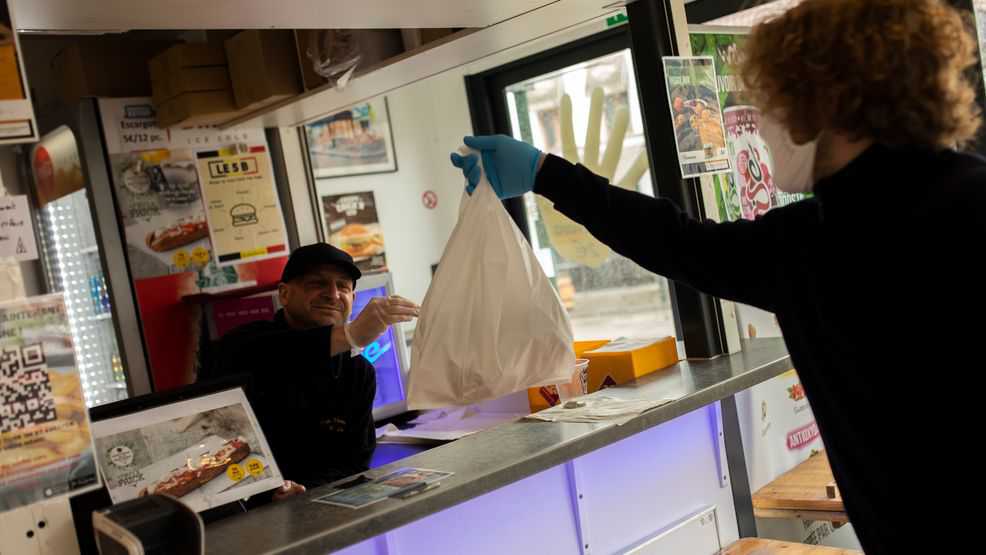Belgians urged to double down on fries, do national duty

Collected
In a country that claims to be the real birthplace of the finger food that Americans have the temerity to call French fries, rescuing the potato industry will certainly be considered a matter of Belgian national pride.
So while a coronavirus lockdown keeps restaurants, bars and several of Belgium's 5,000 frites stands closed, the trade association for the national potato industry is contacting the population most importantly to do its part by keeping deep fryers fired up on the home front.
“Traditionally, Belgians eat fries once a week, and it’s always a festive moment,” Romain Cools, the Belgapom secretary general, said in a phone interview on Tuesday. “Now, we are asking them to eat frozen fries twice weekly at home.”
The demand for frozen potatoes has nosedived in recent weeks, and the Belgian industry faces a possible lack of 125 million euros ($135.5 million), if a huge selection of a great deal of surplus potatoes don't move this year, Cools said.
“This is the first-time in my own 30-year career that I have to ask authorities for help,” he said. “The potato sector is indeed important. It ought to be helped because it’s a flagship for our whole industry.”
As the immediate future remains gloomy, the industry wants to find new methods to move its surplus stock and prevent waste. In partnership with the Dutch-speaking Flemish region of Belgium, Belgapom has create a program to provide 25 a great deal of potatoes weekly to food banks. Companies are working to export some of their supplies to Central Europe and Africa, where in fact the demand remains high.
The industry can be looking at methods to work with starch factories to find other uses for excess potato stocks, such as for example feeding livestock or making green electricity.
Both France and Belgium claim to have invented fried string potatoes as a side dish. But the 'pomme frites" culture is stronger in Belgium, where persons share a taste for beer with the chip-eaters in Britain.
Belgians eat 38 kilograms (about 84 pounds) of fresh potatoes and 6-7 kilograms (13-15 pounds) of processed potatoes in the home each year, according to Belgium’s National Union of Fry-makers. But whether or not consumers unite in upping per capita consumption of fries, the potato sector won’t emerge from the pandemic unscathed.
Prior to the coronavirus reached Europe, the 2020 prospects looked bright for Belgium's potato industry, the world's major exporter, carrying out a 7.5% rise last year in the production of frozen fries. But the virus outbreak halted exports to China, then triggered a slowdown of potato sales across Europe as lockdown measures were implemented.
Supermarkets saw shoppers grab all of the potatoes they could hoard, demand quickly plummeted and kept falling with the closure of fast-food chains, according to Belgapom.
Although Belgium is defined to lift the home confinement order for some the country's 11.5 million people the moment Saturday, no date has been set for restaurants to reopen.
The outside shacks known as “fritkoten” where Belgians queue up day in and day trip in normal times to get their beloved fries, were permitted to remain open for takeaway orders through the national lockdown, but an estimated 80% stayed closed anyway after local authorities offered compensation for shuttered businesses.
Pascal Vandersteegen, the manager at Chez Clementine, a popular fritkot in the south of Brussels, says he has witnessed a l30% loss in earnings as a result of retrictions imposed to address the virus.
"Now, we have to close at 10 p.m. each day” he said. “We used to complete just work at 1.30 a.m., and 6 a.m. on Fridays. But we are an institution. It’s been 30 years that we are here. If everybody closes, there won’t be anything left.”
Source: https://ktxs.com
Tags :
Previous Story
- Indian govt nudges West Bengal to smoothen goods...
- Halide Does Deep Dive Into iPhone SE's Software-Based...
- Bad to worse: Looming locust attack amid coronavirus...
- Bangladesh economy awaits a bigger blow: Economists
- Covid-19 deals a blow to overseas jobs, remittances
- Retailers withhold £2.4bn from Bangladeshi factories, documents show
- UNCTAD: Global e-commerce sales hit $25.6 trillion in...
- UK must lead efforts to safeguard global trade,...